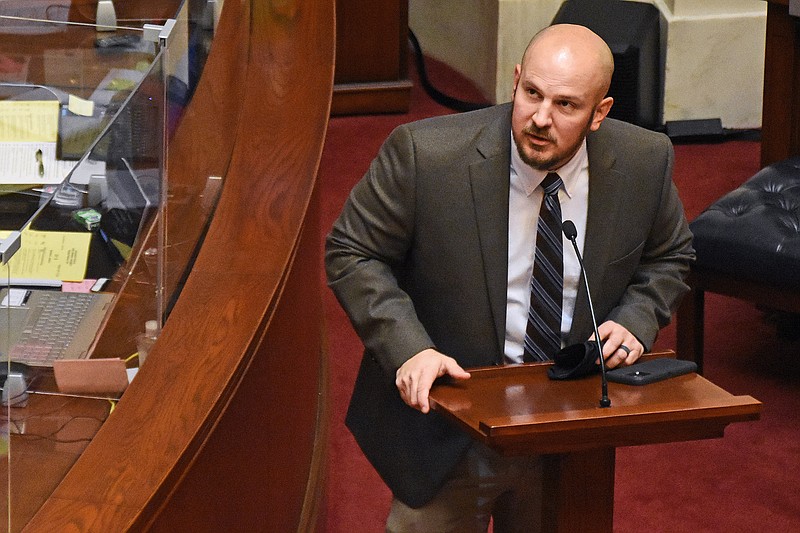A state senator accused of violating Arkansas law by working for a state agency quit his job as a public defender last week.
State Sen. Trent Garner, R-El Dorado, submitted his resignation as a Union County public defender on Friday, according to Daren Nelson, public defender manager for the 13th Judicial District.
Garner, an outgoing lawmaker who took a hard stance on crime during his time in office, left his position as a public defender after facing allegations that he may have illegally served as both a state employee and an elected official.
Gregg Parrish, executive director for the Arkansas Public Defender Commission, said Garner resigned after Parrish sent him an article published by the Blue Hog Report blog that outlined the allegations.
Communications between Parrish and Garner requested earlier this week still weren't available on Wednesday.
Garner declined to comment when reached by phone on Monday.
The left-leaning Blue Hog Report claimed Garner likely violated Arkansas Code Annotated § 21-1-402, a statute that bars officials elected to a "constitutional office" from working for any state agency during their term.
"Constitutional officer," as defined in the law, includes members of the Arkansas Senate and House of Representatives along with the governor and other elected officials. "State agency" encompasses a swath of entities including state commissions, according to the statute.
Garner appears as both an employee of the Arkansas Public Defender Commission with a salary of $59,999.94 and a senator with a salary of $44,356.80 in the state's employee roster.
It's unclear how long Garner served as a public defender. State records list his career service date for both positions as Jan. 1, 2017. Garner's first term in the senate began in 2017.
The Arkansas Times originally confirmed Garner was employed with the Union County public defender's office last week.
Statues generally prohibit elected officials from holding state employment to keep branches of government separate, said Robert Steinbuch, professor at the University of Arkansas at Little Rock William H. Bowen School of Law.
An official working for the executive branch while serving in the legislative branch could be influenced to pass laws that would benefit their state agency. But this was unlikely to happen in the case of a public defender, Steinbuch said.
While public defenders may draw their pay from state coffers, they are ethically bound to represent their indigent clients.
"[Public defenders] don't work for the government," said Steinbuch, who ran unsuccessfully last month for the Republican nomination for a Little Rock state House seat. "They work for the guy charged by the government. They just happen to get a paycheck from the government."
Steinbuch noted state law allows elected officials to work as teachers. Given the challenge of hiring and retaining public defenders, Steinbuch suggested the Legislature should consider making a similar exception for court-appointed attorneys.
"This is a good example of where a law can be overbroad," said Steinbuch. "But we don't ignore the rule. We follow it until we change it."
Before state law took its current form, at least two legislators served as public defenders while in office.
Former state Reps. Robert Jeffrey, D-Camden, and Michael Lamoureux, R-Russellville, who also served in the state Senate, both spent 20 hours a week working for the state's Public Defender Commission while in office. Other legislators held positions with state universities and the Martin Luther King Jr. Commission.
Navigating employment statutes has created confusion for lawmakers in the past.
In 2012, state Rep. Jim Nickels, D-North Little Rock, who was working as an associate professor at the University of Arkansas at Little Rock, objected when the university suggested he seek approval from the state to hold both posts concurrently. Three years before, state Rep. Ann Clemmer, R-Benton, who was working as a political science instructor at the university, established a precedent when she requested and received the state's blessing after winning her seat. But the state's chief financial officer determined Nickels didn't need approval since statutes allowed any person working for a state agency before being elected to continue their employment.
Garner, who served in the U.S. Army Special Forces and worked as an aide to Republican U.S. Sen. Tom Cotton, announced in January that he would not seek re-election. Instead, he planned to build his legal practice and help south Arkansans "reform the judiciary," according to a written statement at the time.
Garner's term as state senator will end in January.
Information for this article was contributed by Michael R. Wickline of the Arkansas Democrat-Gazette.
